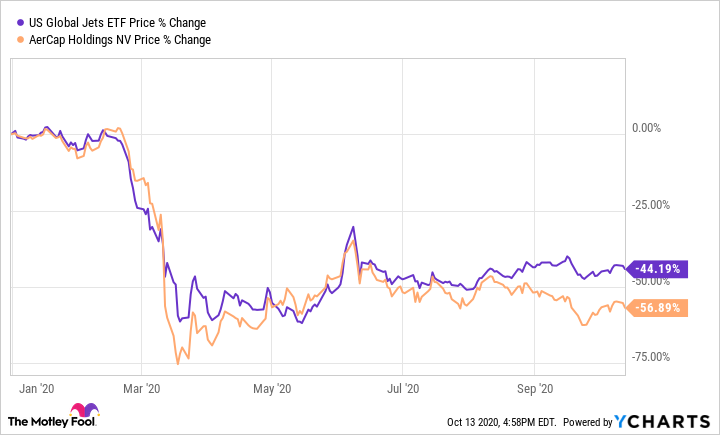It's been seven months since the COVID-19 pandemic brought the U.S. economy to a halt, and the airline industry shows no signs of a recovery. Delta Air Lines (NYSE: DAL) just lost nearly $7 billion in a single quarter, and management said they do not expect the air travel and revenue pictures to normalize until 2022 at the earliest.
Air travel is almost certain to recover eventually, and the airlines have a lot of cash in the bank and a decent chance of riding out the crisis. But even if an investor is willing to take the risk of carriers tumbling into bankruptcy, the stocks seem unlikely to bounce back quickly.
For those interested in investing based on the premise of an eventual airline recovery, who would rather not attempt to pick winners and losers among the airlines, AerCap Holdings (AER -0.63%) stock is well worth considering.
Lots of exposure, little danger
AerCap buys planes from manufacturers like Boeing (NYSE: BA) and Airbus (OTC: EADSY), then leases them to airlines. This system allows carriers to run a more asset-light model, shifting the debt involved in buying aircraft -- and the risk that comes with it -- to the lessors.
This is a tough moment to be a business with a lot of debt, and AerCap's stock has actually been hit harder than many of the airlines. It lost nearly 75% of its value over a two-week stretch in early March, and remains down by 56% for the year.
Airline ETF vs. AerCap data by YCharts
AerCap's business has definitely been impacted, but not as much as the stock's slump would imply. The company has been working with airlines, offering them deferrals on lease payments, which has hurt near-term revenue. As of June 30, AerCap's deferral balance was $430 million, or about 9% of total revenue. The company has $1 billion in security against that amount in case it is never recovered, meaning it is well-insured against the worst-case scenario.
The company owns more than 1,000 planes and leases them to customers all over the globe. Given the global nature of the pandemic, though, there is no place to hide, no growing markets to which it could reallocate some of its now-underutilized aircraft. But regions appear to be recovering from the crisis at different speeds, so AerCap's diversification -- about half of its revenues come from Asia and Europe -- should help.
A survivor's balance sheet
AerCap had total liquidity of $12 billion as of June 30, and the company last month raised $1.5 billion in new debt, demonstrating that it still can tap the finance markets.
The company does have $30 billion in debt, but of that total, only a $1.95 billion secured revolving facility will come due before 2023.
AerCap canceled a portion of the Boeing 737 MAX planes it had on order, and maintains the right to cut additional planes from its order book if their corresponding leases are canceled, but the company is still operating through the pandemic. In the third quarter, it purchased nine new aircraft, and signed lease agreements for 28 aircraft.
The company also sold seven aircraft, mostly older jets that are less fuel-efficient and harder to place with airlines during a downturn. All of the planes AerCap is expected to take delivery on this year and next have lease customers waiting for them.
Should things get worse, AerCap also has tens of billions of dollars worth of unencumbered assets that it could borrow against.

Image source: Getty Images.
AerCap is safer than airline stocks
The bottom line is AerCap has the financial wherewithal to remain airborne through the crisis. Yet the company trades at less than four times expected earnings and less than 0.7 times normalized sales.
Nearly 5% of the global airline fleet has been retired so far in 2020, and more planes are likely to be scrapped. Boeing and Airbus are both scaling back production, and when airlines do begin seeking growth again, their bruised balance sheets make it unlikely they'll want to buy a lot of planes outright.
These long-term market dynamics should work in the favor of lessors, and as the world's largest aircraft lessor, AerCap is well-positioned to thrive in a business where scale and cost-of-capital advantages are critical.
I believe in the long-term outlook for aviation, and I hope most or all of the U.S. airlines make it through this crisis without their stocks getting wiped out in bankruptcy. But it's impossible to say for sure that they will.
No matter what happens to any individual airline, it is hard to imagine a scenario where AerCap collapses. Its stock could struggle until there are some signs of a broader travel recovery, but for those who want to invest in commercial aviation without the risk of choosing from individual airlines, AerCap is the single best choice out there.




